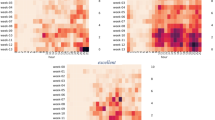Abstract
Lack of timely instructors’ support when the learners are struggling with the course contents and activities is one frequent problem of MOOC learners. The early identification of these learners could help instructors spend part of their limited time assisting them and avoid potential dropouts. This paper presents a MOOC case study that explores the behavior of learners who reported problems in private messages and discussion forums. The study aimed at the identification of parameters that might allow the detection of learners struggling with different course aspects. As the results suggested, the comparison of the learners’ activity traces reveals some common sequences that in the future could facilitate the identification of learners facing problems, even without reporting them. On the other hand, statistical analyses on learners’ behavior showed non-significant differences between the learners reporting putting their maximum effort to overcome a problem before asking for help and the ones who did not.
Access this chapter
Tax calculation will be finalised at checkout
Purchases are for personal use only
Similar content being viewed by others
Notes
- 1.
Learners were expected to discuss and complete the group activities by communicating in private group forums. Groups were composed by 5 or 6 learners.
References
Henderikx, M., Kreijns, K., Kalz, M.: A classification of barriers that influence intention achievement in MOOCs. In: Pammer-Schindler, V., Pérez-Sanagustín, M., Drachsler, H., Elferink, R., Scheffel, M. (eds.) EC-TEL 2018. LNCS, vol. 11082, pp. 3–15. Springer, Cham (2018). https://doi.org/10.1007/978-3-319-98572-5_1
Almatrafi, O., Johri, A., Rangwala, H.: Needle in a haystack: identifying learner posts that require urgent response in MOOC discussion forums. Comput. Educ. 118, 1–9 (2018)
Hew, K.F., Cheung, W.S.: Students’ and instructors’ use of massive open online courses (MOOCs): motivations and challenges. Educ. Res. Rev. 12, 45–58 (2014)
Teusner, R., Hille, T., Staubitz, T.: Effects of automated interventions in programming assignments : evidence from a field experiment. In: Proceedings of the Fifth ACM Conference on Learning @ Scale - L@S 2018, London, United Kingdom (2018)
He, J., Bailey, J., Rubinstein, B.I., Zhang, R.: Identifying at-risk students in massive open online courses. In: Proceedings of the Twenty Ninth AAAI Conference on Artificial Intelligence, pp. 1749–1755 (2015)
Acknowledgements
This research has been partially funded by the European Regional Development Fund and the National Research Agency of the Spanish Ministry of Science, Innovations and Universities under project grants TIN2017-85179-C3-2-R and TIN2014-53199- C3-2R, by the European Regional Development Fund (Operational program of Castile and León) and the Regional Government of Castile and León by the Regional Ministry of Education under the grant BOCYL-D-07062018-6 and the project grant VA257P18, and by the European Commission under project grant 588438-EPP-1-2017-1-EL-EPPKA2-KA.
Author information
Authors and Affiliations
Corresponding author
Editor information
Editors and Affiliations
Rights and permissions
Copyright information
© 2019 Springer Nature Switzerland AG
About this paper
Cite this paper
Topali, P., Ortega-Arranz, A., Dimitriadis, Y., Martínez-Monés, A., Villagrá-Sobrino, S.L., Asensio-Pérez, J.I. (2019). “Error 404- Struggling Learners Not Found” Exploring the Behavior of MOOC Learners. In: Scheffel, M., Broisin, J., Pammer-Schindler, V., Ioannou, A., Schneider, J. (eds) Transforming Learning with Meaningful Technologies. EC-TEL 2019. Lecture Notes in Computer Science(), vol 11722. Springer, Cham. https://doi.org/10.1007/978-3-030-29736-7_56
Download citation
DOI: https://doi.org/10.1007/978-3-030-29736-7_56
Published:
Publisher Name: Springer, Cham
Print ISBN: 978-3-030-29735-0
Online ISBN: 978-3-030-29736-7
eBook Packages: Computer ScienceComputer Science (R0)




